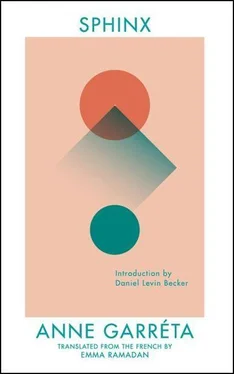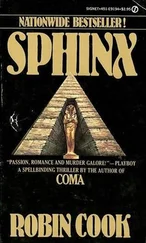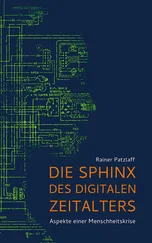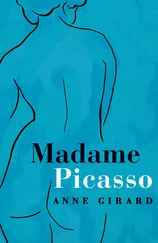Anne Garreta - Sphinx
Здесь есть возможность читать онлайн «Anne Garreta - Sphinx» весь текст электронной книги совершенно бесплатно (целиком полную версию без сокращений). В некоторых случаях можно слушать аудио, скачать через торрент в формате fb2 и присутствует краткое содержание. Год выпуска: 2015, Издательство: Deep Vellum Publishing, Жанр: Современная проза, на английском языке. Описание произведения, (предисловие) а так же отзывы посетителей доступны на портале библиотеки ЛибКат.
- Название:Sphinx
- Автор:
- Издательство:Deep Vellum Publishing
- Жанр:
- Год:2015
- ISBN:нет данных
- Рейтинг книги:3 / 5. Голосов: 1
-
Избранное:Добавить в избранное
- Отзывы:
-
Ваша оценка:
- 60
- 1
- 2
- 3
- 4
- 5
Sphinx: краткое содержание, описание и аннотация
Предлагаем к чтению аннотацию, описание, краткое содержание или предисловие (зависит от того, что написал сам автор книги «Sphinx»). Если вы не нашли необходимую информацию о книге — напишите в комментариях, мы постараемся отыскать её.
is a remarkable linguistic feat and paragon of experimental literature that has never been accomplished before or since in the strictly-gendered French language.
Anne Garréta
Pas un jour Emma Ramadan
Monospace
Sphinx — читать онлайн бесплатно полную книгу (весь текст) целиком
Ниже представлен текст книги, разбитый по страницам. Система сохранения места последней прочитанной страницы, позволяет с удобством читать онлайн бесплатно книгу «Sphinx», без необходимости каждый раз заново искать на чём Вы остановились. Поставьте закладку, и сможете в любой момент перейти на страницу, на которой закончили чтение.
Интервал:
Закладка:
I set about reading the letters from A***. I spread some photographs on the floor, and all day I tried to reconstitute those two lives affected so differently by a shared sundering. When I was hungry, I ordered Cantonese fried rice and sweet and sour chicken from the neighborhood Chinese restaurant. Every day, around five in the afternoon, I would go sit at a table in the Village to write down the story I had mentally reconstituted. I hadn’t notified any of my New York acquaintances that I was in the city. At night I would go to a club without making the effort to meet or recognize anyone. People often did a double take when I passed, as if I had something written on my face, a declaration of my decomposition. One night, while I was waiting on the corner of 54 thStreet for a taxi, I saw a woman who also seemed to be waiting, staring at me. She moved away from me swiftly, down the avenue. I was avoiding all company and in turn, for some obscure reason, people seemed to flee from me.
I left New York on a Thursday toward the end of December. America was absorbed in holiday festivities. It was cold; it snowed on the eve of my departure while I was walking toward Times Square. There was a great silence while the first snowflakes fell; handful by handful they prepared to bury the city, forming a shroud over the night that would soon turn to mud. I went back to the apartment and stretched out on the floor. I looked around me: it was night, the lights outside the windows and the lit but silent television projected onto the walls the shadows of the objects still remaining in the room. My back to the screen, I was observing the wall, alternately bluish and red. The shadows trembled and swayed with the rhythmic changes of lighting on the screen. Police car sirens and flashing lights passed rapidly along the avenue below. I was thinking about how this was the last time I would ever sleep in this apartment. This place, so strange, became estranged from me, and, above all, was lost. I was experiencing a premature nostalgia, which was sucking me into a state of melancholy; I was imagining all of this was closed off to me forever before I had even lost it. I saw people pass, rush before my eyes, and no one made me feel anything anymore. The world was dead and yet continued to strut upon its stage. In vain. Within three days, all of this would be dead to me, with no hope of remission. Walking in the streets, flying in planes, taking taxis had lost all meaning; there was no one waiting for me on the other side. This was the last place where something was still familiar. Henceforth everything would be exterior to me, the world a wasteland. I remained with eyes open, unable to escape the creeping sensation, insinuating itself in my flesh, that all was coming to an end. This old woman who had just died was, I suddenly realized, my last link to the world. There was no other. I no longer knew how to speak, those years of continued hopelessness had sealed my soul in a tomb, and nothing mattered to me anymore. All that had had meaning for me was now withdrawn — I hadn’t been able to hold on to any of it — sucked back in like the sea, and I was turning into ice. Someone else would be living here soon; places and traces are swallowed up, disappear and erase themselves, wiping memory’s slate clean. All these traces were disappearing and leaving me behind. I knew then that my destiny was only that: to linger on in a deserted world. I felt ice and injury, a fissure forevermore exposed to harsh blasts from the outside. I stayed quiet, unable to pay attention to anyone, absorbed entirely in my own horror, singular and inexpressible.
In the morning I went to the cemetery. Feet in the snow, I was standing before the tomb where the bodies of A*** and A***’s mother were resting. Their names were engraved on a black marble headstone. I wanted to pray but couldn’t get past the first verse. The cold numbed my jaw and the words swirled within me; I couldn’t pin them down. I wavered a bit, trembling with cold and despair, with powerlessness. I was thinking about this old woman whom I had barely had the time to know, lying beneath me and holding the white rose I had slid into her left hand just before the casket had been closed. And further down: my beloved, returned to dust.
I wanted to write down these two lives, these successive deaths that had annihilated my will to live, that had rendered senseless any project, any investment in a world to which I no longer had any ties.
In fact it had become impossible for me to think of anything else; I needed to devote what was left of my willpower to undertaking the story of my beloved in the form of a biography, to be tidied up later once freed from the infinite reemergence of dispersed fragments in the wandering of waking dreams. Perhaps, if I were to accomplish this task, I would be delivered from the torture inflicted on me by the endless rumination and unruly resurgences that, rather than coming together to form a continuum, only thrust to the surface fractured and atrociously mutilated limbs. I settled into a modest hotel room in Amsterdam at the border of the red-light district and imposed a sort of house arrest upon myself.
This is where for two weeks in front of a typewriter I have endlessly forced my memory to purge itself of its possessor and, with the help of notes hastily made a long time ago or jotted down during my final days in New York, to retrace and reestablish the contours of this love.
I can finally type these words: THE END. My recollections are finally outlined and crystallized in imprinted phrases, no longer roaming incoherently through my memory. I am no longer living solely through remembering, trying to flee from the memory of these deaths I have at last put down in words.
I push back my chair, close the typewriter, and place it on the ground. Opposite me is a stack of pages, sitting atop the table that has served as my desk in this hotel room where I allocated my wandering. I crack the joints in my fingers one after another. I lean back and the chair cracks, too, under the pressure of my reclining. I stare at this miserable heap that has turned me into a recluse for the time it took to construct this narrative. I am powerless to free my gaze. What do I do now with this pile of paper, impossible to neatly classify as an essay, novel, or allegorical memoir?
At last, I wrest myself from this position. This hour is the last that I will have spent at the table that I forbade myself to leave before the thread of this ultimate unwinding of memory had been exhausted. And now I am, I think, free; I can rise and cross the threshold of the bedroom where I wove and imprisoned the vision transfixing me.
I can cast off my anchor and walk through the city streets, my mind delivered from the funereal brooding that kept leading me to the same abyss.
And so I rise, pushing the pile of pages to the upper left corner of the table. I unhook the jacket that upon my arrival I had relegated to the wardrobe, stinking of naphthalene. I stumble over the dinner tray I ordered earlier tonight (and every night for the past two weeks), turn the key, open the door and cross the threshold. The staircase is dark; it’s eleven o’clock and tonight winter is spreading over the canals, turning them to ice. I walk aimlessly through streets, along quays, over bridges. I recognize a cabaret. Farther down, I pass a row of windows behind which women are exhibiting and offering themselves, to be consumed behind drawn curtains.
I plunge into the heart of this district given over to venality and artifice. The nearby port bordering the area sweeps the streets with a wind that brings odors of oil or sometimes of sewers. Brushed by this wind, skin takes on the taste of salt. I lean forward to escape from the onslaught of icy gusts that petrify the immobile bystander. The humidity permeates clothing and condenses above the canals in thick slabs of mist.
Читать дальшеИнтервал:
Закладка:
Похожие книги на «Sphinx»
Представляем Вашему вниманию похожие книги на «Sphinx» списком для выбора. Мы отобрали схожую по названию и смыслу литературу в надежде предоставить читателям больше вариантов отыскать новые, интересные, ещё непрочитанные произведения.
Обсуждение, отзывы о книге «Sphinx» и просто собственные мнения читателей. Оставьте ваши комментарии, напишите, что Вы думаете о произведении, его смысле или главных героях. Укажите что конкретно понравилось, а что нет, и почему Вы так считаете.












